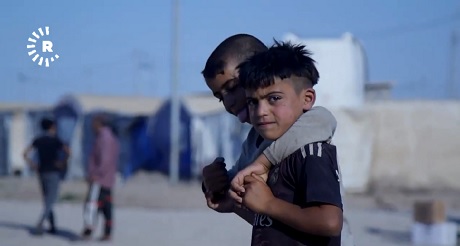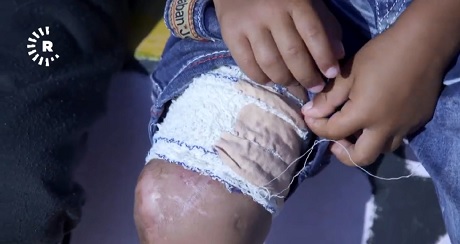Two years since liberation, Mosul’s children face daily challenges

MOSUL, Iraq – Two years on from the liberation of Mosul in one of the fiercest urban battles since World War II, the children of the northern Iraqi city are still struggling, lacking vital documentation and assistance.
The Old City, on the west bank of the Tigris River, was reduced to rubble during the battled to retake Mosul from the Islamic State group (ISIS). Unable to escape, many civilians were caught in the crossfire.
Akram Ali, 6, was seriously injured in an airstrike during the battle while out looking for food with his mother. Two years later, he still wears a bandage on his leg and walks with a limp.
“My mother was looking for flour to make bread. I was with her. A jet came and hit me. My mother then carried me,” Akram told Rudaw through tears.
His friend Adnan Rashid was also injured in the war. While trying to escape from the east side of the city, he and his family found themselves in a minefield.
He and six of his siblings were injured when a device detonated. An American-run hospital was unable to save his brother’s life.
“We set out at night, and we could smell the rubble, the odor of dead humans. The bodies were in front of us, and we had to step over them. We were three families when we set out,” said Adnan, showing the scars his sustained to his abdomen.
He says a bomb also killed his cousin, severing her head.
As of April 2019, some 1.7 million Iraqis are still displaced, including 800,000 children, according to the UN children’s fund UNICEF.
Some 3.3 million children under age of 18 still require humanitarian assistance, the agency says. Since the start of 2018, some 232 children “have suffered grave violations of their rights” which include killing, maiming, or recruitment into armed groups.
Save the Children estimates 2.5 million children will need “emergency education support” in 2019.
Iraqi government aid has been channeled into reconstruction efforts to help displaced families return to their homes. However, the documentation of children is frequently overlooked.
The Norwegian Refugee Council (NRC) says 45,000 Iraqi children born under ISIS rule are unable to obtain documentation and identity papers required to access healthcare and education.
Those born to ISIS parents are particularly vulnerable, leaving them on the margins of society and open to radicalization.
Mothers wait in line at a Barzani Charity Foundation (BCF) “legal clinic” in Mosul, hoping to resolve the legal conundrum facing their children.
According to BCF officials, they have resolved the cases of 300 children. They are also caring for around 5,000 orphans.
“We had to open a legal clinic to obtain IDs for these children lacking any documentation by preparing 10 volunteer lawyers who work on this case. Fortunately, in the past eight months, out of the 500 cases we had, we resolved 300 of them,” Rizgar Obeid, head of BCF’s Mosul office, told Rudaw.
Local officials in Nineveh place the blame on central government.
“It is only that there are some local and international organizations, and their programs are mostly psychological.”
With reporting from Huner Ahmed


The Old City, on the west bank of the Tigris River, was reduced to rubble during the battled to retake Mosul from the Islamic State group (ISIS). Unable to escape, many civilians were caught in the crossfire.
Akram Ali, 6, was seriously injured in an airstrike during the battle while out looking for food with his mother. Two years later, he still wears a bandage on his leg and walks with a limp.
“My mother was looking for flour to make bread. I was with her. A jet came and hit me. My mother then carried me,” Akram told Rudaw through tears.
Akram, 6, shows the wound he sustained to his leg during the battle for Mosul. Photo: Rudaw TV
His friend Adnan Rashid was also injured in the war. While trying to escape from the east side of the city, he and his family found themselves in a minefield.
He and six of his siblings were injured when a device detonated. An American-run hospital was unable to save his brother’s life.
“We set out at night, and we could smell the rubble, the odor of dead humans. The bodies were in front of us, and we had to step over them. We were three families when we set out,” said Adnan, showing the scars his sustained to his abdomen.
He says a bomb also killed his cousin, severing her head.
As of April 2019, some 1.7 million Iraqis are still displaced, including 800,000 children, according to the UN children’s fund UNICEF.
Some 3.3 million children under age of 18 still require humanitarian assistance, the agency says. Since the start of 2018, some 232 children “have suffered grave violations of their rights” which include killing, maiming, or recruitment into armed groups.
Children without documentation struggle to access healthcare and education. Photo: Rudaw TV
Save the Children estimates 2.5 million children will need “emergency education support” in 2019.
Iraqi government aid has been channeled into reconstruction efforts to help displaced families return to their homes. However, the documentation of children is frequently overlooked.
The Norwegian Refugee Council (NRC) says 45,000 Iraqi children born under ISIS rule are unable to obtain documentation and identity papers required to access healthcare and education.
Those born to ISIS parents are particularly vulnerable, leaving them on the margins of society and open to radicalization.
Mothers wait in line at a Barzani Charity Foundation (BCF) “legal clinic” in Mosul, hoping to resolve the legal conundrum facing their children.
According to BCF officials, they have resolved the cases of 300 children. They are also caring for around 5,000 orphans.
“We had to open a legal clinic to obtain IDs for these children lacking any documentation by preparing 10 volunteer lawyers who work on this case. Fortunately, in the past eight months, out of the 500 cases we had, we resolved 300 of them,” Rizgar Obeid, head of BCF’s Mosul office, told Rudaw.
Local officials in Nineveh place the blame on central government.
“The Daesh children and families in the camps are very dangerous because the government still doesn’t have a comprehensive program on how to resolve the issue,” Ghazwan Dawoudi, head of the human rights committee on the Nineveh Provincial Council, told Rudaw, using the Arabic acronym for ISIS.
“It is only that there are some local and international organizations, and their programs are mostly psychological.”
With reporting from Huner Ahmed


